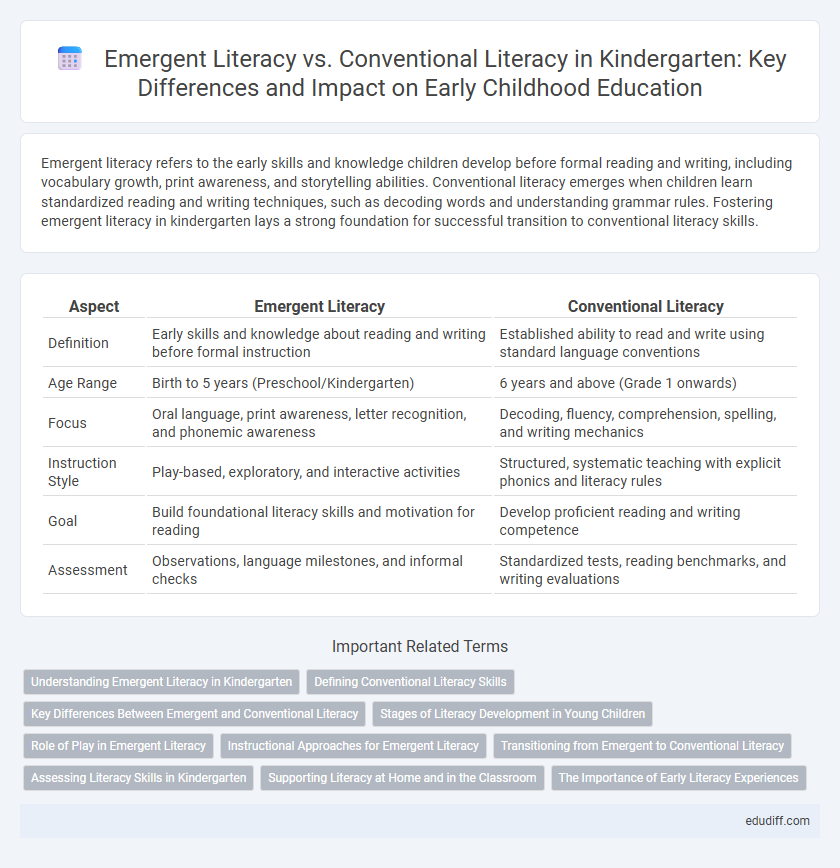Emergent literacy refers to the early skills and knowledge children develop before formal reading and writing, including vocabulary growth, print awareness, and storytelling abilities. Conventional literacy emerges when children learn standardized reading and writing techniques, such as decoding words and understanding grammar rules. Fostering emergent literacy in kindergarten lays a strong foundation for successful transition to conventional literacy skills.
Table of Comparison
| Aspect | Emergent Literacy | Conventional Literacy |
|---|---|---|
| Definition | Early skills and knowledge about reading and writing before formal instruction | Established ability to read and write using standard language conventions |
| Age Range | Birth to 5 years (Preschool/Kindergarten) | 6 years and above (Grade 1 onwards) |
| Focus | Oral language, print awareness, letter recognition, and phonemic awareness | Decoding, fluency, comprehension, spelling, and writing mechanics |
| Instruction Style | Play-based, exploratory, and interactive activities | Structured, systematic teaching with explicit phonics and literacy rules |
| Goal | Build foundational literacy skills and motivation for reading | Develop proficient reading and writing competence |
| Assessment | Observations, language milestones, and informal checks | Standardized tests, reading benchmarks, and writing evaluations |
Understanding Emergent Literacy in Kindergarten
Emergent literacy in kindergarten includes children's early skills such as letter recognition, vocabulary development, and print awareness, laying the foundation for reading and writing. Unlike conventional literacy, which involves fluent reading and writing, emergent literacy emphasizes interactive experiences like storytelling, rhyming, and environmental print. Fostering emergent literacy through play-based and language-rich activities supports cognitive development and prepares children for formal education.
Defining Conventional Literacy Skills
Conventional literacy skills in kindergarten encompass the ability to recognize letters, decode simple words, and write basic sentences with correct spelling and punctuation. These skills develop after emergent literacy and include understanding phonics, grammar, and sentence structure necessary for reading fluency. Mastering conventional literacy enables children to transition from symbol recognition to proficient reading and writing.
Key Differences Between Emergent and Conventional Literacy
Emergent literacy develops during early childhood through play, exploration, and interactions, emphasizing skills like oral language, print awareness, and phonological sensitivity, while conventional literacy involves mastering reading, writing, and comprehension skills typically taught in formal education. Emergent literacy is characterized by informal learning experiences and foundational abilities, whereas conventional literacy focuses on decoding, fluency, and structured language use. Understanding these key differences helps educators tailor instruction to support children's progressive literacy development effectively.
Stages of Literacy Development in Young Children
Young children's literacy development progresses from emergent literacy, which includes recognizing letters, understanding print concepts, and developing vocabulary, to conventional literacy characterized by fluent reading and writing skills. Emergent literacy stages involve skills such as phonemic awareness, letter-sound correspondence, and oral language growth, laying the foundation for later conventional literacy. By mastering these stages, children transition from initial exposure to text towards independent reading and writing competence necessary for academic success.
Role of Play in Emergent Literacy
Play fosters emergent literacy by creating interactive environments where children develop foundational language skills, narrative understanding, and symbolic thinking essential for reading and writing. Through role-playing, storytelling, and imaginative activities, preschoolers enhance vocabulary and phonological awareness crucial for later conventional literacy acquisition. Early engagement in playful literacy experiences supports cognitive and social-emotional growth that underpins successful transition to formal literacy instruction.
Instructional Approaches for Emergent Literacy
Emergent literacy instruction in kindergarten emphasizes play-based learning, oral language development, and interactive read-alouds to build foundational skills such as phonemic awareness and vocabulary. Strategies include using songs, rhymes, storytelling, and letter recognition activities that engage children in meaningful, context-rich environments. This approach contrasts with conventional literacy, which focuses on formal decoding and comprehension skills, typically introduced after emergent literacy foundations are well established.
Transitioning from Emergent to Conventional Literacy
Transitioning from emergent literacy to conventional literacy in kindergarten involves shifting from recognizing letters and sounds to decoding words and understanding text structure. Phonemic awareness, vocabulary development, and exposure to print-rich environments accelerate this progression. Targeted instructional strategies that integrate reading, writing, and oral language skills support children in mastering conventional literacy conventions by the end of the year.
Assessing Literacy Skills in Kindergarten
Assessing literacy skills in kindergarten involves distinguishing emergent literacy, characterized by foundational skills such as letter recognition, phonemic awareness, and vocabulary development, from conventional literacy, which includes decoding, fluency, and comprehension abilities. Observation and formative assessments target emergent literacy milestones like print awareness and narrative skills, while early conventional literacy is measured through basic reading and writing tasks adapted to developmental levels. Effective assessment tools enable educators to tailor instruction, fostering a seamless transition from emergent to conventional literacy foundations.
Supporting Literacy at Home and in the Classroom
Supporting literacy at home and in the classroom enhances emergent literacy by encouraging activities such as shared reading, storytelling, and letter recognition games that build foundational skills. Emergent literacy focuses on developing print awareness, phonological awareness, and oral language, laying the groundwork before children transition to conventional literacy involving reading and writing proficiency. Consistent reinforcement through interactive literacy-rich environments accelerates children's ability to decode, comprehend, and effectively communicate in written language.
The Importance of Early Literacy Experiences
Early literacy experiences in kindergarten play a crucial role in bridging emergent literacy and conventional literacy development, laying a foundation for reading and writing skills. Activities such as storytelling, letter recognition, and phonemic awareness promote cognitive growth and language acquisition during this critical period. Research shows children exposed to rich literacy environments in early childhood demonstrate higher achievement in conventional literacy by elementary school.
Emergent literacy vs Conventional literacy Infographic

 edudiff.com
edudiff.com